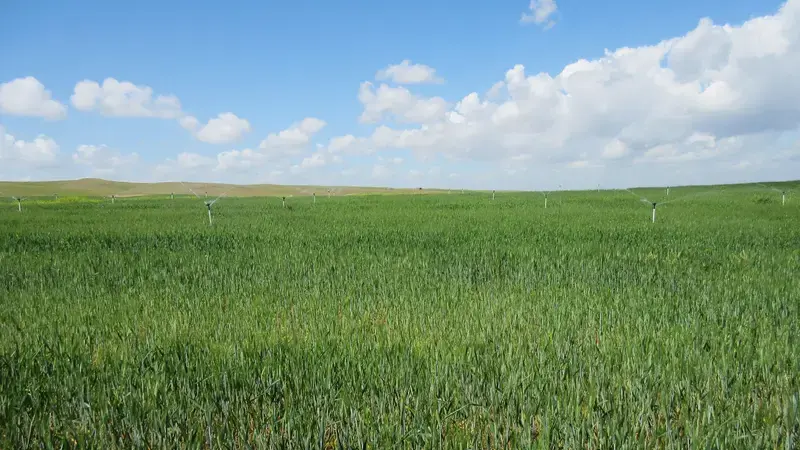Climate-resilient supplementary irrigation

- Vinay Nangia - Research Team Leader - Soils, Waters and Agronomy
- Theib Oweis – Senior Researcher
ICARDA’s supplemental irrigation innovation is a simple but highly effective technology that allows farmers to plant and manage crops at the optimal time without having to wait for unpredictable rainfall.
Across much of the West Asia and North Africa (WANA) region, annual evapotranspiration exceeds rainfall, and this, along with highly irregular precipitation patterns made worse by climate change, results in harsh conditions where periods of drought cause substantial yield losses. Wheat yields, for example, are only at one-third of their potential in some areas.
ICARDA’s Supplemental Irrigation (SI) helps overcome this by supplying only the minimum amount of water required to rainfed crops to stabilize and increase yields when rain fails to provide enough water for healthy plant growth. ICARDA’s breakthroughs include the fine-tuning of when and how much to irrigate, where to source water, what associated agronomic practices to follow, and best diversification of cropping systems - all aimed at maximizing physical and economic crop water productivity as well as water security for nutrition under a changing climate.
ICARDA SI innovation supports ‘more with less’ agriculture through the development of packages (guidance, training, and inputs) that allow:
-
Optimal irrigation – using minimal water to grow crops profitably, avoiding water wastage.
-
Deficit irrigation – supplying minimal water only at drought-sensitive growth stages.
-
Irrigation timing – balancing plant needs with different day and seasonal evapotranspiration times.
-
Balancing water use against what can actually be grown in different soil fertility levels.
-
Responsive varieties and strategies for reducing water footprint, maximizing water productivity, and avoiding climate extremes.
-------------------------------------------------------------------------------------
IMPACT
-
Where introduced by ICARDA, SI has substantially increased the yields of the rainfed crops (by up to 470%) with the application of small amounts of water, making it feasible to scale up in water-scarce areas. SI provides higher and more stable yields, lower risk of crop failure, and significantly higher crop water productivity, significantly improving farmers’ income.
-
ICARDA and partners, including farming organizations and farmers, developed and optimized supplemental irrigation packages for crops and cropping systems in Iran, Iraq, Jordan, Lebanon, Morocco, Syria, Tunisia, and Turkey. Several countries in sub-Saharan Africa, including Burkina Faso and Niger, have launched their own programs based on ICARDA’s innovation, FAO GACSA promotes it as a climate-smart practice, and the World Bank has used ICARDA’s research on supplemental irrigation as an investment note for development clients.
Further Reading:
Vinay Nangia, Theib Oweis, Francis Kemeze, Julian Schnetzer. (1/3/2018). Supplemental Irrigation: A promising Climate-Smart Practice for Dryland Agriculture. Beirut, Lebanon: International Center for Agricultural Research in the Dry Areas (ICARDA). https://hdl.handle.net/20.500.11766/9003
Theib Oweis, Ahmed Hachum. (2/4/2012). Supplemental Irrigation: A Highly Efficient Water‐Use Practice. Beirut, Lebanon: International Center for Agricultural Research in the Dry Areas (ICARDA).https://repo.mel.cgiar.org/handle/20.500.11766/7524
Vinay Nangia, Theib Oweis. (26/8/2016). Supplemental Irrigation: A Promising Climate-resilience Practice for Sustainable Dryland Agriculture, in "Innovations in Dryland Agriculture". Cham, Switzerland: Springer Verlag (Germany). https://repo.mel.cgiar.org/handle/20.500.11766/5975
